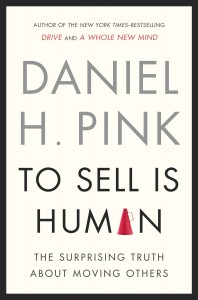 The premise of Daniel Pink’s new book, To Sell Is Human
The premise of Daniel Pink’s new book, To Sell Is Human, is that almost everyone sells. Regardless of whether you are a quota-carrying salesperson, you need to influence and persuade others to be effective in what you do. I’ve said the same thing many times in my blog, but it’s also time to throw a note of caution into the discussion.
We need a reminder that there’s a huge difference between selling as a part of what you do on a regular basis, and selling as a profession. When your ability to put food on the table depends on your performance of a specific skill, it requires a huge qualitative difference in how you approach that skill.
To illustrate my point, let’s look at an analogy. In knowledge work, everyone also writes. It may only be emails, or it may be longer and more elaborate reports, but the ability to write definitely makes a difference in your career progression. But writing as part of your job does not make you a writer—certainly not one who could be mentioned in the same sentence as a Daniel Pink.
It’s like the difference between a churchgoer and the pastor, or the difference between coaching your kid’s T-ball team and being a professional coach. To use a cliché, it’s like the difference between the chicken and the pig when it comes to ham and eggs. One is involved and the other is committed.
Professional salespeople are committed because they get measured and paid primarily for their success at selling—they can get fired for not accomplishing their primary task. If an engineer has trouble selling his or her ideas, their career progression might be slowed, but they won’t get fired. If a health care worker is ineffective at selling a treatment plan to a patient (one of Pink’s favorite examples), the patient suffers the consequences. If a salesperson is unable to sell something the customer needs, the customer may suffer, but the salesperson is going to feel the immediate consequences.
Professionals have to produce. When you make a living by doing something, you have to do it even when you don’t feel like it, like a shark that has to keep swimming. That’s why professional salespeople have to sell even when they don’t want to. They also know the drudgery of “dialing for dollars”, and of having to be on at all times, in a way that amateurs don’t. In the same vein, professional writers know that they have to write even when they don’t feel like it. Pink, for example, holds himself to a daily word count, because no one pays you for words you don’t write.
Because of this, the bar for sales performance is much higher, and the commitment to the craft and skill is correspondingly in a different league entirely.
Why does this matter? Because if selling is to be taken seriously as a profession, it’s critical to dispel the myth that anyone with no training or skill can be a successful salesperson, and the related idea that sales is just a refuge for those who couldn’t handle the more difficult subjects in college. Let’s keep in mind that a professional salesperson (especially in the B2B arena) has to become proficient in a wide range of general disciplines, including complex technologies embedded in their product, general business and industry acumen, psychology, persuasive expression (including writing—although it doesn’t make them writers). Added to those general disciplines are skills directly related to sales, such as questions, dealing with objections, sales strategies and processes, connecting features to benefits, and territory management, to name just a few. They have to thoroughly learn these skills (and keep learning, because things are changing so fast), because they are committed.
I really like To Sell Is Human, partially because it does a great job in dispelling harmful sales myths, especially the one that selling is somehow slimy or distasteful. But I am afraid that taking too literally his idea that everyone is in sales risks propagating another harmful myth.


